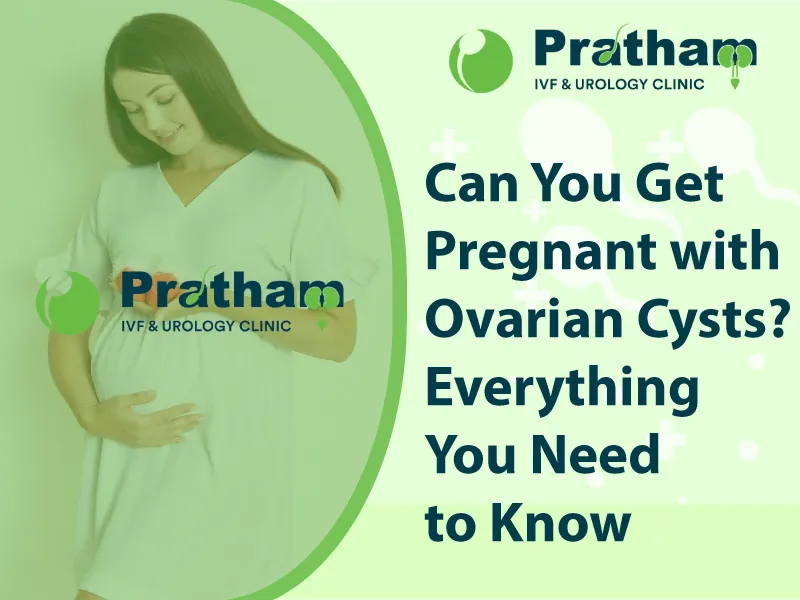
Ovarian cysts are common, fluid-filled sacs that develop on or in the ovaries. The ovarian cysts can appear innocuous and resolve on their own, but according to their size, structure, and symptoms, they may present issues, particularly for women starting to become pregnant. Here we will explore ovarian cysts in detail, their impact on pregnancy, potential risks, and treatment options available for women wishing to become pregnant.
What Are Ovarian Cysts?
Ovarian cysts are fluid-filled sacs that develop in or on an ovary. These cysts are relatively common, and most women will experience them at some point in their lives. In many cases, ovarian cysts don’t cause any symptoms and are discovered during routine gynecological exams or imaging tests.
Common Types of Ovarian Cysts
- Functional Cysts: These are some of the most frequent types of ovarian cysts, which usually arise during the menstrual cycle. They include:
- Follicular cysts: These form when an egg isn’t released during ovulation.
- Corpus luteum cysts: It develop after the egg is expelled and its follicle fills with liquid.
- Dermoid Cysts: These cysts contain tissues like hair, skin, or teeth. They are less common but require treatment when they cause discomfort.
- Endometriomas: Associated with endometriosis, these cysts form when endometrial tissue grows outside the uterus and attaches to the ovaries.
- Polycystic Ovary Syndrome (PCOS): Women with PCOS may have multiple cysts on their ovaries, affecting hormonal balance and menstrual cycles.
Causes of Ovarian Cysts
Ovarian cysts form when the follicle, which usually releases an egg during ovulation, doesn’t open or close after releasing the egg, leading to fluid accumulation. Hormonal changes, pregnancy, and endometriosis can also contribute to the formation of cysts. In some cases, ovarian cysts may be a result of underlying medical conditions, such as PCOS or ovarian cancer (though this is rare).
Pregnancy and Ovarian Cysts
Can You Get Pregnant with Ovarian Cysts?
Yes, most women with ovarian cysts can still conceive. Functional cysts, such as follicular or corpus luteum cysts, typically don’t cause fertility issues and often resolve on their own. However, larger cysts or certain types, such as those associated with PCOS or endometriomas, can interfere with the reproductive process.
Impact of Ovarian Cysts on Fertility
The type, size, and location of the ovarian cyst can impact fertility:
- PCOS: Women with PCOS often experience hormonal imbalances that prevent regular ovulation, which can make it more difficult to conceive.
- Endometriomas: These cysts can interfere with the function of the ovaries, and in some cases, may lead to scarring that can make it more challenging to get pregnant.
- Other Cysts: Most functional cysts do not affect fertility, but large cysts may put pressure on the ovaries, causing irregular ovulation or blocked fallopian tubes.
Women with ovarian cysts should check their health and talk to their doctor about reproductive issues.
Risks and Complications During Pregnancy with Ovarian Cysts
Pregnancy with ovarian cysts generally carries few risks, but larger or more complicated cysts may pose challenges:
- Ovarian Torsion: Large cysts can twist the ovary, causing severe pain and potentially affecting pregnancy.
- Rupture: A large cyst may rupture during pregnancy, causing sharp pain and bleeding, which can be dangerous if left untreated.
- Miscarriage or Preterm Labor: Though rare, large cysts or complications associated with cysts could potentially lead to miscarriage or preterm labor.
Pregnant women with cysts should be closely monitored by their healthcare provider to manage any complications that arise.
Treatment Options for Ovarian Cysts
How Ovarian Cysts Are Typically Treated
Treatment for ovarian cysts depends on the type, size, and symptoms:
- Observation: Small, functional cysts that cause no symptoms may only need to be monitored and typically resolve on their own.
- Medications: Hormonal birth control may be prescribed to regulate the menstrual cycle and prevent future cysts.
- Surgical Removal: If the cyst is large, persistent, or causes severe symptoms, it may need to be removed surgically. In some cases, ovarian cysts can be removed laparoscopically, which is minimally invasive.
- Fertility Treatments: Women with PCOS or endometriomas may undergo fertility treatments such as ovulation induction or IVF to increase their chances of conception.
Tips for Women Trying to Conceive
Women that are attempting to become pregnant and have ovarian cysts should speak with a fertility an expert. For those with PCOS, lifestyle changes such as weight management, a balanced diet, and regular exercise can help regulate hormones and improve fertility. For women with larger cysts or endometriomas, treatment options like surgery or IVF may be recommended.
Lifestyle and Prevention of Ovarian Cysts
While some ovarian cysts are unavoidable, certain lifestyle changes can reduce the risk of developing them:
- Maintain a Healthy Weight: Excess weight can exacerbate hormonal imbalances, particularly in women with PCOS.
- Balanced Diet: A well-balanced diet high in vitamins, fiber, antioxidants, and healthy fats helps improve hormonal balance and reproductive wellness.
- Regular Exercise: Physical activity can help manage weight, improve insulin sensitivity, and promote regular ovulation, all of which help reduce the risk of ovarian cysts.
- Manage Stress: Chronic stress can affect hormonal balance and lead to reproductive health issues. Stress reduction strategies such as yoga or meditation might be effective.
Advice for Women With Ovarian Cysts Who Want to Get Pregnant
Women who have experienced ovarian cysts in the past should continue to monitor their reproductive health with the help of a healthcare provider. Regular ultrasounds and tests can ensure the absence of new cysts and allow early intervention if needed. It’s also helpful to maintain a healthy lifestyle, reduce stress, and manage any underlying conditions like PCOS or endometriosis to improve the chances of conception.
Conclusion
Ovarian cysts are common, and while they can sometimes interfere with fertility or pregnancy, many women with cysts can still conceive and have healthy pregnancies. The kind and size of the cyst, as well as any related health disorders such as PCOS or endometriosis, have a major effect on fertility and pregnancy outcomes. Treatment options are available, ranging from observation and medication to surgery and fertility treatments, depending on the situation.
If you are concerned about ovarian cysts and your fertility, you should consult your doctor. Early detection, regular monitoring, and a treatment plan can improve your chances of conceiving. Schedule your appointment today at Pratham IVF Center Ahmedabad, where our expert team will guide you through your fertility journey. Call +91 98797 80105 to take the first step towards realizing your dream of parenthood.
 Ahmedabad Top Rated IVF Center
Ahmedabad Top Rated IVF Center




